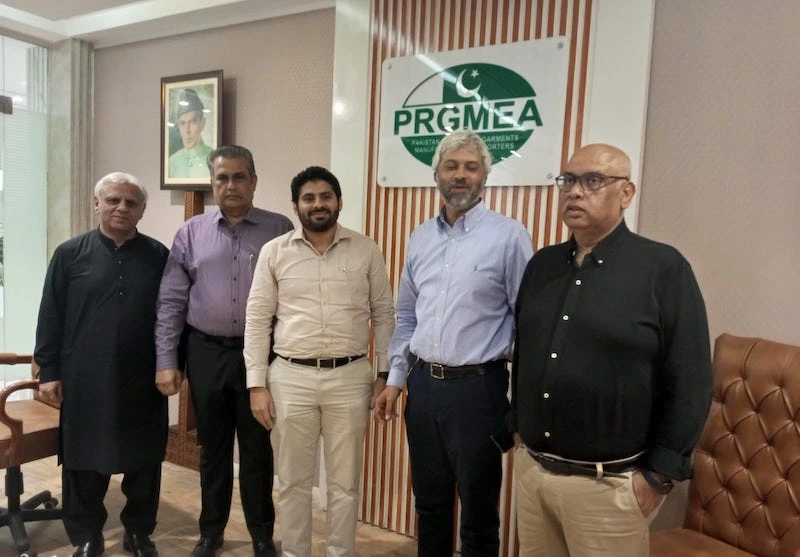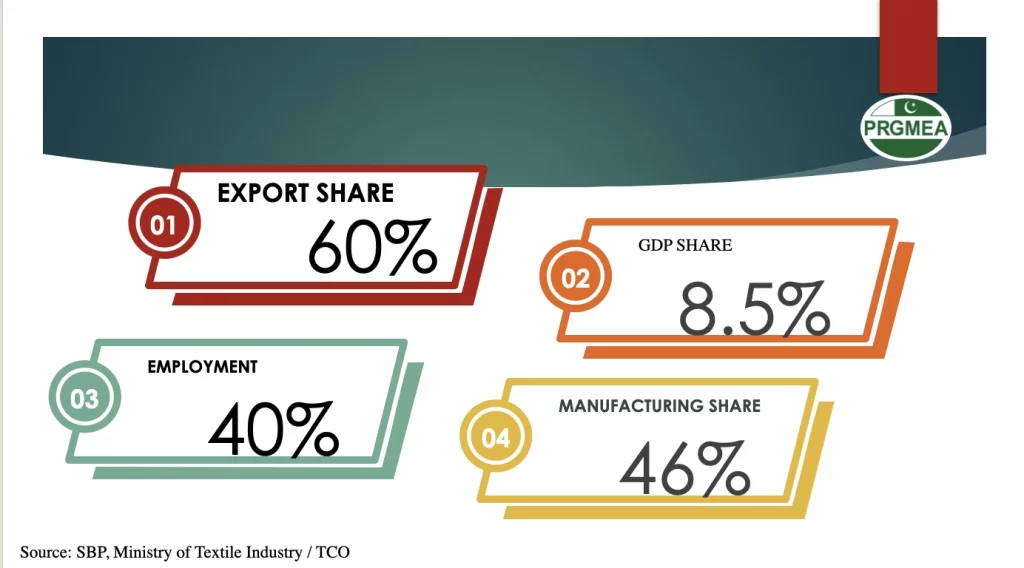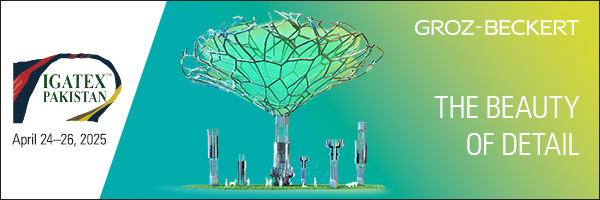PRGMEA a leading association in the Pakistan textile and garment industry, is proud to announce the appointment of Mr. Ahmad Hanif as the new President of the Pakistan Readymade Garments Manufacturers and Exporters Association (PRGMEA).
Mr. Hanif brings a wealth of experience and leadership to this esteemed position. With an extensive background in the textile industry and a proven track record of fostering growth and innovation, he is well-poised to lead PRGMEA into a new era of excellence.
Mr. Ahmad Hanif is recognized for his unwavering commitment to the growth and prosperity of the Pakistani textile and apparel sector. His strategic vision, coupled with a deep understanding of industry dynamics, positions him as a catalyst for positive change within PRGMEA.
In assuming the role of President, Mr. Hanif expresses his commitment to advancing the interests of the readymade garments manufacturers and exporters in Pakistan. His vision includes initiatives to enhance industry competitiveness, foster sustainable practices, and facilitate collaboration within the sector.
Mr. Ahmad Hanif said Kohan Textile Journal “It is an honor to serve as the President of PRGMEA. I am excited about the opportunities that lie ahead, and I look forward to working collaboratively with industry stakeholders to drive positive change and growth.”

About PRGMEA:
Pakistan Readymade Garments Manufacturers and Exporters Association
- PRGMEA is the premier trade organization representing the Readymade Garments Industry in Pakistan, having its offices in Karachi, Lahore and Sialkot to safeguard the interests of the RMG Exporters.
- PRGMEA has a strong membership of more than 600 companies who are exporters of value added garment and textile sector.
- The Association is the member of the International Apparel Federation (IAF) and fully supports the cause of development of SME sector in Pakistan.
- PRGMEA is a bridge between Government Agencies and the Garment Exporters in resolving their issues and also assists in developing trade relationships with other countries.
Mission Statement & Objectives
PRGMEA’s mission is to effectively utilize all possible resources at its disposal into developing a vibrant garment industry for Pakistan and to supports its members by providing reliable and effective services.
- Providing advice and services to manufacturers and exporters for better environment in trade
- Monitoring export performance, providing related information and market knowledge to members
- Encouraging exports by advocating for a better export environment, removing difficulties and shortcomings in the readymade garments trade, through continuous interaction with concerned bodies & institutions.
- PRGMEA provides feedback to government on the budget, trade policy, trade agreements, taxation issues, customs issues, etc.
- PRGMEA participates in various trade expo’s and organizes business delegations to various countries
Pakistan Readymade Garments Technical Training Institute (PRGTTI)
PRGMEA envisioned the future challenges of the RMG sector and established two Institutes to meet the challenges of human resources development, design & research input.
- Pakistan Readymade Garments Technical Training Institute (PRGTTI): PRGTTI is offering its courses to the Apparel sector since its inception at Lahore & Karachi. This gives an opportunity to access the textile market situation with respect to human resources. The curriculum at PRGTTI has designed by keeping in view the courses offered at world’s renowned institutions abroad.
- Apparel Design and Research Centre (ADRC): The objective of ADRC is to support RMG SME’s through provision of locally available and competitive design services and market intelligence.
IAF Regional office in PRGMEA
A regional office of the International Apparel Federation (IAF) opened in the building of Pakistan Readymade Garments Manufacturers and Exporters Association (PRGMEA) Sialkot sub-Office.
35th IAF World Fashion Convention
PRGMEA organized “35th IAF World Fashion Convention” in collaboration with the International Apparel Federation (IAF) in Lahore-Pakistan..
IAF and PRGMEA have chosen the theme of ‘Let’s Grow Together for a More Prosperous and Sustainable Future’.
In this Convention, brands, retailers, and manufacturers from the fashion industry gathered in a country that is one of the world’s main suppliers of garments to discuss in detail how we can all collaborate to build the most competitive supply chains.
Around 180 delegates attended the three-day convention in which various activities, including exhibitions, fashion show and seminars have been arranged. Honourable President Dr. Arif Alvi inaugurated the Convention.
Textile and Clothing Industry of Pakistan

Pakistan’s Export Performance
(Value in USD Billion):
PRHMEAMembers’ Exports Share In Total Textile Export Of Pakistan

Country-wise Export of Readymade Garments

Role of PRGMEA on SDG’s
- In September 2015, the General Assembly of the United Nations adopted the 2030 Agenda for Sustainable Development.
- This includes 17 Sustainable Development Goals (SDGs). The goals build on the vital principle of “leaving no one behind”, and emphasizes a holistic approach to achieving sustainable development for all.
- PRGMEA plays a crucial role in advancing sustainable development in the country and contributes significantly to several SDGs, notably SDG-1 (No Poverty), SDG-4 (Quality Education), SDG-13 (Climate Action), and SDG-17 (Partnerships for the Goals).
PRGMEA Commitment to Sustainability
- PRGMEA members are very proactive when it comes to Green Initiatives.
- PRGMEA encourages their members for Recycling Projects.
- They encourage textile sector to use organic cotton
- Several members of PRGMEA have also been certified by US Green Building Council for LEED (Leadership in Environmental and Energy Design).
- PRGMEA also encourage to adopt zero discharge practices by following ZDHC protocols.
- PRGMEA also encourages their members to use renewable energy such as solar power plants.
- The main objective of project was to improve economic efficiency and ecological sustainability of the textile industry by using adopted techniques and technologies.
Pakistan Textile and Garment Industry Potentials and Advantages
The Pakistan textile and garment industry holds several potentials and advantages in the international market, contributing to its competitiveness and appeal. Some of these strengths include:
- Abundant Raw Material Availability: Pakistan is among the top cotton-producing countries globally
- Cost-Effective Manufacturing: The country offers competitive labor costs
- Vertical Integration: Pakistan’s textile industry is often vertically integrated, encompassing everything from spinning to the production of finished garments.
- Skilled Workforce: The industry benefits from a skilled labor force with expertise in various stages of the production process
- Geopolitical Advantage: Pakistan’s strategic geographical location allows for relatively easy access to major markets in Asia, Europe, and the Middle East.
- Diverse Product Range: Pakistani manufacturers produce a diverse range of products
Preference in Certain Markets: Pakistani textiles have a strong preference in certain markets due to their quality, craftsmanship, and competitive pricing. - Trade Agreements and GSP+ Status: Pakistan benefits from various trade agreements and preferential trade programs like the European Union’s GSP+ (Generalized Scheme of Preferences Plus) status, which provides tariff preferences for exports to the EU market.
- Adaptability to Trends: The industry has shown adaptability to global fashion trends and consumer preferences.
However, despite these advantages, the industry faces challenges as well, such as energy shortages, infrastructure limitations and regional competition.
Continued investment in technology, innovation, infrastructure, and sustainable practices, along with addressing these challenges, will further enhance the competitiveness and potentials of the Pakistan textile and garment industry in the international market.
Pakistan Textile and Garment industry in Middle East and Africa
The Pakistan textile and fashion industry holds substantial potential in the Middle East and Africa due to factors such as geographical proximity, trade agreements, cultural alignment, high demand, and competitive pricing.
To capitalize on these advantages and ensure future success, the industry should adapt to regional trends, prioritize quality and compliance, emphasize innovation in design, invest in effective marketing and distribution, and incorporate sustainable practices. By addressing these areas, Pakistan can strengthen its position and increase market share in the Middle East and Africa.





















